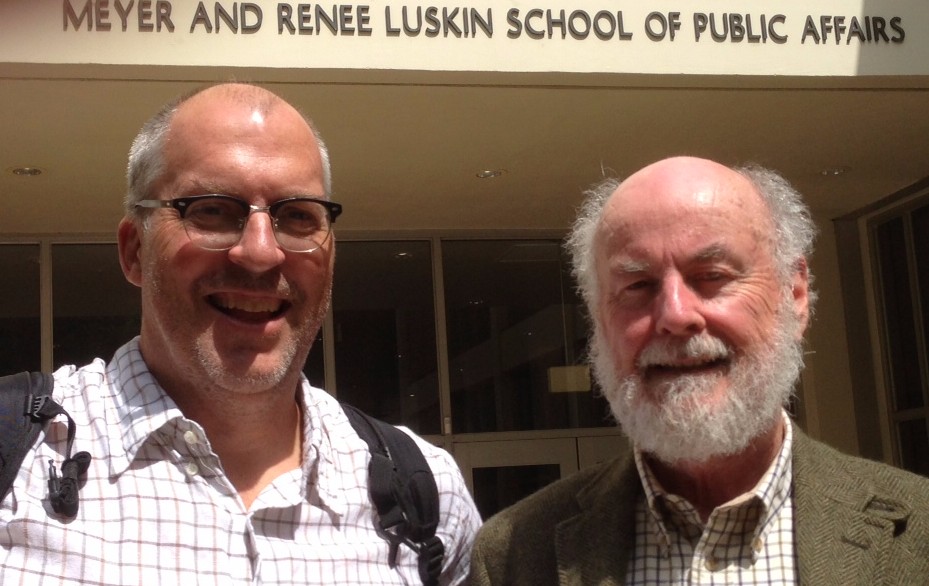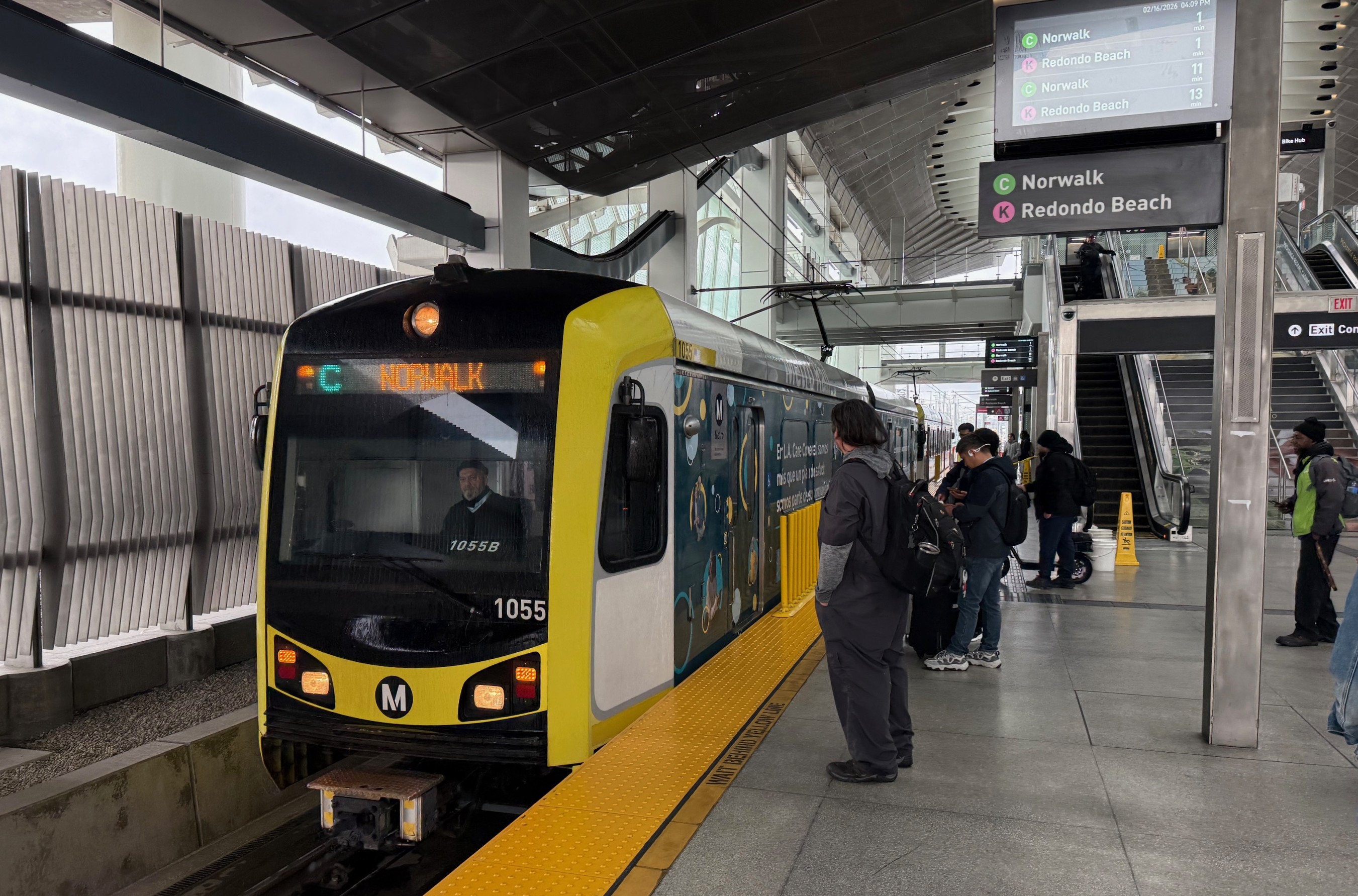This week, the L.A. City Council took the first steps toward eliminating off-street parking requirements for new development. The motion (Council file 25-0642) by Councilmembers Bob Blumenfield, Nithya Raman, and Katy Yaroslavsky directs city departments to report on the feasibility of citywide elimination of off-street parking requirements for new development.
Typically Streetsblog L.A. doesn't report on motions that have just been introduced, as this is a very early step in a long process. Lots of motions are introduced each year; many never get a public hearing. But the mainstream media got a hold of this parking motion and already blew it out of proportion, so SBLA will try to set the record straight.
Coverage at KABC and LAist raised the specter of new apartments with no parking.
KABC wrote: "Neighborhoods like Koreatown are already known as parking nightmares, and some fear that residents of these new parking-free developments will further strain street parking." (emphasis added)
LAist's headline begins "New homes with no parking?" The article dwells on "buildings are already under development with zero on-site parking" and "parking-free buildings" before going on to clarify that "many developers would likely choose to continue providing on-site parking, even if the city no longer required it."
The motion language (which is great - a sort of Donald Shoup 101 - included in its entirety below) is very clear. It repeatedly stresses that eliminating city-imposed parking requirements is not the same as eliminating parking:
[Parking scholar Donald] Shoup did not contend that new development should not provide parking. Rather, he demonstrated that governments are ill-equipped to determine how many parking spaces a business actually needs...
Shoup concluded that the people who develop properties and the institutions that finance development - who are literally deeply invested in the economic success of the properties, i.e., their ability to rent apartments or commercial space - are best positioned to determine how much parking a project should provide.
and
It bears repeating that those who construct new housing have every incentive to rent (or sell) that housing, and will provide the amounts of parking necessary for them to do so...
[Eliminating requirements citywide would make it so] a developer can - from the start - design a project based on its actual parking needs...
It bears SBLA repeating: even when the city doesn't require a set minimum number of parking spaces, developers will still build plenty of new parking at new buildings.
For the foreseeable future, parking-free developments will remain rare.
Yes, there are occasional car-free developments. They are unicorns - newsworthy and memorable because they are so rare. Mainly they're affordable housing developments; the lack of parking serves as one more reason to pile criticism onto a project that many neighbors would still oppose even if it had parking.
The motion notes that other cities - San Francisco, San Jose, and Sacramento - have eliminated parking requirements. Closer to home, CulverCity eliminated parking requirements citywide in 2022. Lancaster, Santa Monica, and San Diego have removed excessive parking mandates for much of their core neighborhoods, as has L.A. City for several parts of the central city. The motion further notes that state law (A.B. 2097 approved in 2022) prevents cities from mandating parking minimums near high-quality transit.
None of these other parking reform cities/areas are seeing large numbers of parking-free developments.
No-parking-required cities are seeing small reductions in the amount of new parking built at new development. Instead of meeting excessive one-size-fits-all municipal requirements (L.A. City has long required 2.5 parking spaces per apartment), new development is right-sizing parking. This modest change is good for walkability, housing (quantity, affordability), climate - and it streamlines city approval processes.
But don't take Streetsblog's word for it, read the full text of the L.A. City parking reform motion introduced this week:
Donald Shoup, a professor of urban planning at UCLA for 50 years, died on February 6, 2025. Shoup authored the landmark 2005 book The High Cost of Free Parking. His academic research and writing focused on the issue of parking and how arbitrarily-created, government-imposed minimum parking requirements both drive up the cost of development and result in cities that are oriented toward cars rather than people.
This results in unsafe streets and increased traffic deaths and injuries; buildings surrounded by parking lots instead of compact, walkable commercial districts; and more expensive housing.
Shoup's work has led many local governments to change their parking policies. It would be a fitting legacy for Los Angeles-the place where Donald Shoup spent his career-explore the feasibility of eliminating parking minimums for changes of use and for new development.
To be clear, Shoup did not contend that new development should not provide parking. Rather, he demonstrated that governments are ill-equipped to determine how many parking spaces a business actually needs; that parking requirements embedded in most zoning codes were either derived from studies at a handful of suburban or rural locations where virtually every visitor has no choice but to drive, thus overstating parking demand in areas where people have other travel options, or simply copied from another jurisdiction. For example, the City of Los Angeles requires five times as much parking for a gym than it does for a yoga studio; and twice as much parking for an art gallery than for a barber shop. Our parking requirements are not rational.
Shoup concluded that the people who develop properties and the institutions that finance development - who are literally deeply invested in the economic success of the properties, i.e., their ability to rent apartments or commercial space-are best positioned to determine how much parking a project should provide.
More than 3,000 cities have adopted at least some of Shoup's suggested parking reforms, including Los Angeles. In response to the COVID pandemic, the City adopted the Emergency Ordinance, which promotes adaptive reuse of existing buildings by allowing changes of use without triggering additional parking requirements. This has worked well for both businesses and their customers, and has not had adverse impacts on neighborhoods. Through legislation such as AB 2097, the State of California has eliminated parking requirements near major transit stops. However, many cities have gone beyond Los Angeles and eliminated parking requirements citywide, including San Francisco, San Jose, and Sacramento.
While it is true that most people in Los Angeles own cars and drive, it is not true that everyone does so. According to the American Community Survey, there are approximately 770,000 households in Los Angeles with zero or only one vehicle, more than half of all households. There are approximately 480,000 single-person households in the City of Los Angeles (31.5% of the total), who are unlikely to need more than one vehicle. Self-driving vehicles already provide transportation from Downtown to the ocean, and will continue to proliferate, reducing the need for personal vehicles. However, our standard parking requirements are based on the flawed assumption that nearly every household has at least two cars; and that everyone drives for nearly all of their trips. Just as we allow people to select how many bedrooms and bathrooms they want in the apartments they rent, we could allow them to select how many parking spaces they need.
Moreover, Los Angeles suffers from a severe housing affordability crisis. One of Shoup's most important contributions to the public discourse on parking requirements was to highlight just how much parking spaces can cost. Underground parking can cost more than $50,000 per space to construct, and thus can add more than $100,000 to the cost of a housing unit. We must find ways to reduce the cost of constructing new housing, and eliminating parking requirements is one way to do so. It bears repeating that those who construct new housing have every incentive to rent (or sell) that housing, and will provide the amounts of parking necessary for them to do so.
Brick-and-mortar retail stores and restaurants struggle to keep their doors open, due to economy-wide shifts toward on-line shopping and delivery services as well as local ordinances and policies. Amazon is not required to provide parking for its delivery vehicles that flood many of our neighborhoods, and neither are pop-up restaurants that operate under our sidewalk vending rules. We should level the playing field to support local businesses and neighborhood commercial districts.
Although State laws such as A.B. 2097 preclude the City from imposing parking requirements in areas near major transit stops, a citywide approach offers advantages. The routes and frequency of transit service can shift over time, which can be due to fiscal challenges at Metro or other transit providers rather than a change in demand. Instead of requiring a determination from Planning or Building & Safety about whether A.B. 2097 or some other exemption applies at some point in the process, a developer can-from the start-design a project based on its actual parking needs. In short, a citywide rule ensures consistency and predictability.
I THEREFORE MOVE that the Department of City Planning, in consultation with the Department of Building & Safety, be INSTRUCTED to report with recommendations regarding the feasibility and cost-benefit analysis of citywide elimination of off-street parking requirements for new development and changes of use.







